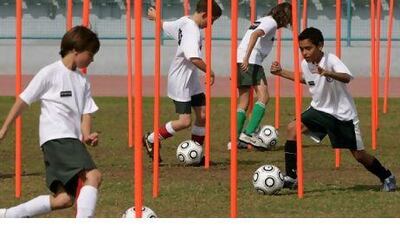ABU DHABI // The foundations have been laid for the UAE to produce world class sports stars but the hard work has yet to be done, say international sportsmen.
While they say the UAE has some of the world's best facilities and high-profile international events, getting Emirati children to a point where they can compete against the world's best will take sustained dedication.
"To see the world's best players up close is something," said Jonathan Davies, himself a former Welsh rugby star and now a television commentator.
That is something on which the UAE is working hard. In golf alone, the Emirates Airline Invitational was held last week and the Abu Dhabi HSBC Golf Championship at Abu Dhabi Golf Club finished yesterday. The Saadiyat Beach Classic charity tournament hosted by Gary Player tees off this morning.
The Yas Marina Circuit saw Sebastian Vettel win the Formula One drivers' championship in November. In sailing, Dubai held the Louis Vuitton Trophy, while next month some of the world's best tennis players will play in the Dubai Tennis Championships.
Next year, the Volvo Ocean Race, described as the Everest of sailing, will stop off in Abu Dhabi. The capital will also have a boat competing in the race.
"There is nothing like sport to create adrenaline," said Davies. "Now the structure is in place for those kids to go into those sports. They have to start by maybe going into schools and creating facilities at grass-roots level."
There already is some grass-roots momentum. In December, Mubadala sponsored tennis in schools, a chance for children to pick up a racket for the first time.
The Manchester United Soccer in Schools camp is now up and running in the capital, helping thousands of children develop their football skills. And last year, a local team were runners-up in the international F1 in Schools programme, developing an F1 team, and designing and racing a wooden car.
"It's about striking a balance between raising awareness and getting children to participate," said Davies.
The Scottish rugby star Gavin Hastings said that while the facilities here were excellent, having the best of everything would not necessarily get results.
More important, he said, was practice. "You are not going to get there on talent alone, either in tennis, golf or any other global sport.
"The difference between somebody being very good and somebody being exceptional, I think, is down to the amount of work they put into it."
The Irish golfer Padraig Harrington, twice an Open champion, emphasised the need for children to learn to work as a team. "If you play on a team, you learn how to win and lose, and celebrate and commiserate. They get that sort of experience they need to bring in to one sport to go into full time," Harrington said.
Youngsters needed good competition too, he said. "First step is beating those around them. If you can beat those guys around you, you get on the international circuit. It starts off with best in your club, then city, then country, and that's how you progress."
Without stiff local competition, he said, young players were unlikely ever to win overseas.
The Abu Dhabi Tourism Authority (ADTA) has tried hard to build the profile of golf in the UAE, domestically and internationally. Lawrence Franklin, the authority's director of strategy, said the major tournaments served to inspire young golfers.
"Investment in grass-roots player development is a key component of Abu Dhabi's longer-term goals, and it is something which is already bearing fruit," Mr Franklin said. One example of that, he said, was Khalid al Yousef, a 22-year-old Emirati who competed in the Abu Dhabi HSBC Golf Championship.
"Whether it is through increasing access to enhanced training facilities, or by providing opportunities for young golfers to get involved in top-tier competitions or feeder events - such as the Abu Dhabi Junior Golf Championship - the future certainly looks bright for tomorrow's local golf stars," Mr Franklin said.

